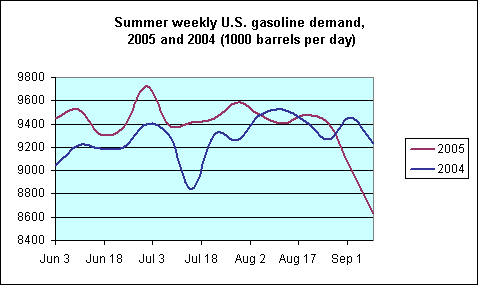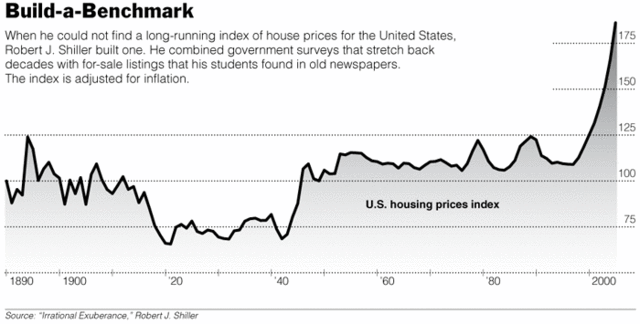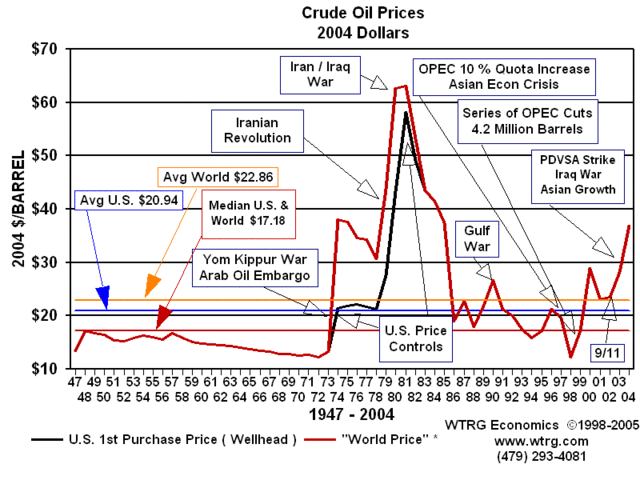You will have to forgive this post if it gets a little long or theoretical. Yesterday I made the mistake of going jogging when it was still 114 degrees outside, and I guess I discovered why biblical prophets seem to always get their visions out in the desert.
One of the worst ideas that affect public policy around the world is that wealth is somehow zero sum - that it can be stolen or taken or moved or looted but not created. G8 protesters who claim that poor nations are poor because wealthy nations have made them that way; the NY Times, which for a number of weeks actively flogged the idea that the fact of the rich getting richer in this country somehow is a threat to the rest of us; Paul Krugman, who fears that economic advances in China will make the US poorer: All of these positions rest on the notion that wealth is fixed, so that increases in one area must be accompanied by decreases in others. Mercantilism, Marxism, protectionism, and many other destructive -isms have all rested on zero sum economic thinking.
My guess is that this zero-sum thinking comes from our training and intuition about the physical world. As we all learned back in high school, nature generally works in zero sums. For example, in any bounded environment, no matter what goes on inside (short of nuclear fission) mass and energy are both conserved, as outlined by the first law of thermodynamics. Energy may change form, like the potential energy from chemical bonds in gasoline being converted to heat and work via combustion, but its all still there somewhere.
In fact, given the second law of thermodynamics, the only change that will occur is that elements will end in a more disorganized, less useful form than when they started. This notion of entropic decay also has a strong effect on economic thinking, as you will hear many of the same zero sum economics folks using the language of decay on human society. Take folks like Paul Ehrlich (please). All of there work is about decay: Pollution getting worse, raw materials getting scarce, prices going up, economies crashing. They see human society driven by entropic decline.
So are they wrong? Are economics and society driven by something similar to the first and second laws of thermodynamics? I will answer this in a couple of ways.
First, lets ask the related question: Is wealth zero sum and is society, or at least the material portions of society, always in decline? The answer is so obviously no to both that it is hard to believe that these concepts are still believed by anyone, much less a large number of people. However, since so many people do cling to it, we will spend a moment or two with it.
The following analysis relies on data gathered by Julian Simon and Stephen Moore in Its Getting Better all the Time: 100 Greatest Trends of the Last 100 Years. In fact, there is probably little in this post that Julian Simon has not said more articulately, but if all we bloggers waited for a new and fresh idea before we blogged, well, there would not be much blogging going on.
Lets compare the life of an average American in 1900 and today. On every dimension you can think of, we all are orders of magnitude wealthier today (by wealth, I mean the term broadly. I mean not just cash, like Scrooge McDuck's big vault, but also lifespan, healthiness, leisure time, quality of life, etc).
- Life expectancy has increase from 47 to 77 years
- Infant mortality rates have fallen from one in ten to one in 150.
- Average income - in real dollars - has risen from $4,748 to $32,444
In 1900, the average person started their working life at 13, worked 10 hours a day, six days a week with no real vacation right up to the day they died in their mid-forties. Today, the average person works 8 hours a day for five days a week and gets 2-3 weeks of vacation. They work from the age of 18, and sometimes start work as late as 25, and typically take at least 10 years of retirement before they die.
But what about the poor? Well, the poor are certainly wealthier today than the poor were in 1900. But in many ways, the poor are wealthier even than the "robber barons" of the 19th century. Today, even people below the poverty line have a good chance to live past 70. 99% of those below the poverty line in the US have electricity, running water, flush toilets, and a refrigerator. 95% have a TV, 88% have a phone, 71% have a car, and 70% have air conditioning. Cornelius Vanderbilt had none of these, and his children only got running water and electricity later in life.
To anticipate the zero-summer's response, I presume they would argue that the US somehow did this by "exploiting" other countries. Its hard to imagine the mechanism for this, especially since the US did not have a colonial empire like France or Britain, and in fact the US net gave away more wealth to other nations in the last century (in the form of outright grants as well as money and lives spent in their defense) than every other nation on earth combined. I won't go into the detailed proof here, but you can do the same analysis we did for the US for every country in the world: Virtually no one has gotten worse, and 99.9% of the people of the world are at least as wealthy (again in the broad sense) or wealthier than in 1900. Yes, some have slipped in relative terms vs. the richest nations, but everyone is up on an absolute basis.
Which leads to the obvious conclusion, that I shouldn't have had to take so much time to prove: The world, as a whole and in most of its individual parts, is wealthier than in was in 1900. Vastly more wealthy. Which I recognize can be disturbing to our intuition honed on the physical world. I mean, where did the wealth come from? Out of thin air? How can that be?
Interestingly, in the 19th century, scientists faced a similar problem in the physical world in dating the age of the Earth. There was evidence all around them (from fossils, rocks, etc) that the earth had to be hundreds of millions, perhaps billions of years old. The processes of evolution Darwin described had to occur over untold millions of years. Yet no one could accept an age over a few million for the solar system, because they couldn't figure out what could fuel the Sun for longer than that. Every calculation they made showed that by any form of combustion they understood, the sun would burn out in, at most, a few tens of millions of years. If the sun and earth was so old, where was all that energy coming from? Out of thin air?
It was Einstein that solved the problem. E=mc2 meant that there were new processes (e.g. fusion) where very tiny amounts of mass were converted to unreasonably large amounts of energy. Amounts of energy so large that it tends to defy human intuition. Here was an enormous, really huge source of potential energy that no one before even suspected.
Which gets me back to wealth. To balance the wealth equation, there must be a huge reservoir out there of potential energy, or I guess you would call it potential wealth. This source is the human mind. All wealth flows from the human mind, and that source of energy is also unreasonably large, much larger than most people imagine.
But you might say - that can't be right. What about gold, that's wealth isn't it, and it just comes out of the ground. Yes, it comes out of the ground, but how? And where? If you have ever traveled around the western US, say in Colorado, you will have seen certain hills covered in old mines. It always fascinated me, how those hills riddled with shafts looked, to me, exactly the same as the 20 other hills around it that were untouched. How did they know to look in that one hill? Don Boudroux at Cafe Hayek expounded on this theme:
I seldom use the term "natural resource." With the possible
exception of water, no resource is natural. Usefulness is not an
objective and timeless feature ordained by nature for those scarce
things that we regard as resources. That is, all things that are
resources become resources only after individual human beings
creatively figure out how these things can be used in worthwhile ways
for human betterment.
Consider, for example, crude oil. A natural resource? Not at all. I
suspect that to the pre-Columbian peoples who lived in what is now
Pennsylvania, the inky, smelly, black matter that oozed into creeks and
streams was a nuisance. To them, oil certainly was no resource.
Petroleum's usefulness to humans "“ hence, its value to humans "“ is
built upon a series of countless creative human insights about how oil
can be used and how it can be cost-effectively extracted from the
earth. Without this human creativity, oil would objectively exist but
it would be either useless or a nuisance.
A while back, I published this anecdote which I think applies here:
Hanging out at
the beach one day with a distant family member, we got into a
discussion about capitalism and socialism. In particular, we were
arguing about whether brute labor, as socialism teaches, is the source
of all wealth (which, socialism further argues, is in turn stolen by
the capitalist masters). The young woman, as were most people her age,
was taught mainly by the socialists who dominate college academia
nowadays. I was trying to find a way to connect with her, to get her
to question her assumptions, but was struggling because she really had
not been taught many of the fundamental building blocks of either
philosophy or economics, but rather a mish-mash of politically correct
points of view that seem to substitute nowadays for both.
I
picked up a handful of sand, and said "this is almost pure silicon,
virtually identical to what powers a computer. Take as much labor as
you want, and build me a computer with it -- the only limitation is you
can only have true manual laborers - no engineers or managers or other
capitalist lackeys".
She
replied that my request was BS, that it took a lot of money to build an
electronics plant, and her group of laborers didn't have any and
bankers would never lend them any.
I
told her - assume for our discussion that I have tons of money, and I
will give you and your laborers as much as you need. The only
restriction I put on it is that you may only buy raw materials - steel,
land, silicon - in their crudest forms. It is up to you to assemble
these raw materials, with your laborers, to build the factory and make
me my computer.
She thought for a few seconds, and responded "but I can't - I don't know how. I need someone to tell me how to do it"
The only real difference between beach sand, worth $0, and a microchip, worth thousands of dollars a gram, is what the human mind has added.
The economist Julian Simon is famous for his rebuttals of the zero summers and the pessimists and doom sayers, arguing that the human mind has unlimited ability to bring plenty our of scarcity.
"The ultimate resource is people - especially skilled, spirited, and hopeful young people endowed with liberty- who will exert their wills and imaginations for their own benefit, and so inevitably benefit not only themselves but
the rest of us as well."
As a final note, it is worth mentioning that the world still has only harnessed a fraction of this potential. To understand this, it is useful to look back at history.
From the year 1000 to the year 1700, the world's wealth, measured as GDP per capita, was virtually unchanged.
Since 1700, the GDP per capita in places like the US has risen, in real
terms, over 40 fold. This is a real increase in total wealth, created by the human mind. And it was unleashed because the world began to change in some fundamental ways around 1700 that allowed the human mind to truly flourish. Among these changes, I will focus on two:
-
There was a philosophical and intellectual
change where questioning established beliefs and social patterns went
from being heresy and unthinkable to being acceptable, and even in
vogue. In other words, men, at first just the elite but soon everyone,
were urged to use their mind rather than just relying on established
beliefs
-
There were social and political changes that greatly increased
the number of people capable of entrepreneurship. Before this time,
the vast vast majority of people were locked into social positions that
allowed them no flexibility to act on a good idea, even if they had
one. By starting to create a large and free middle class, first in the
Netherlands and England and then in the US, more people had the ability
to use their mind to create new wealth. Whereas before, perhaps 1% or
less of any population really had the freedom to truly act on their
ideas, after 1700 many more people began to have this freedom.
So today's wealth, and everything that goes with it (from shorter
work hours to longer life spans) is the result of more people using
their minds more freely.
The problem (and the ultimate potential) comes from the fact that in many, many nations of the world, these two changes have not yet been allowed to occur. Look around the world - for any country, ask yourself if the average
person in that country has the open intellectual climate that
encourages people to think for themselves, and the open political and
economic climate that allows people to act on the insights their minds
provide and to keep the fruits of their effort. Where you can answer
yes to both, you will find wealth and growth. Where you answer no to
both, you will find poverty and misery.
Even in the US, regulation and the inherent conservatism of the bureaucracy slow our potential improvement. Republicans block stem cell research, Democrats block genetically modified foods, protectionists block free trade, the FDA slows drug innovation, regulatory bodies of all stripes try to block new business models.
All over the world, governments shackle the human mind and limit the potnetial of humanity.


